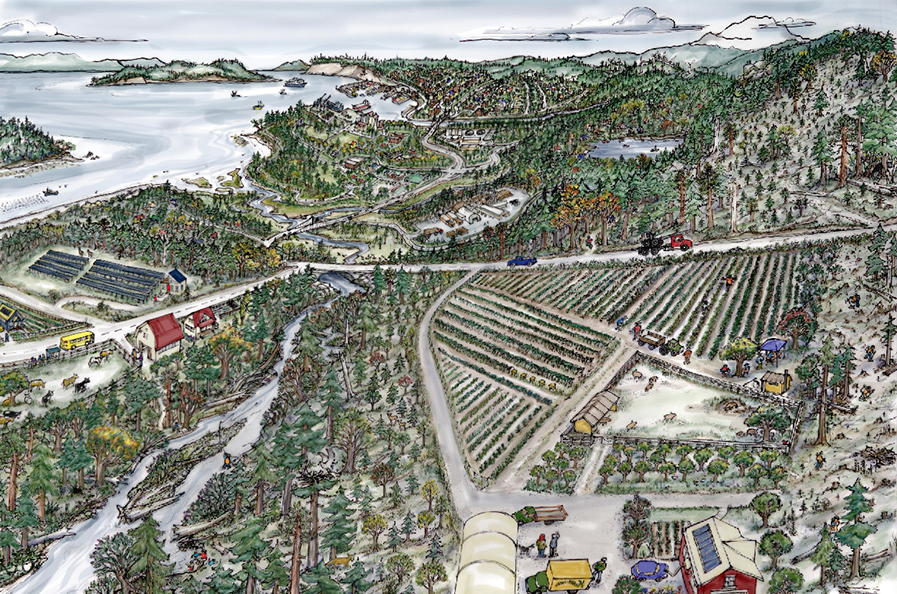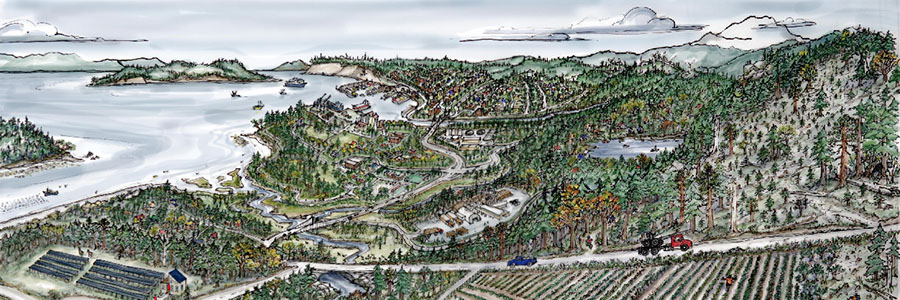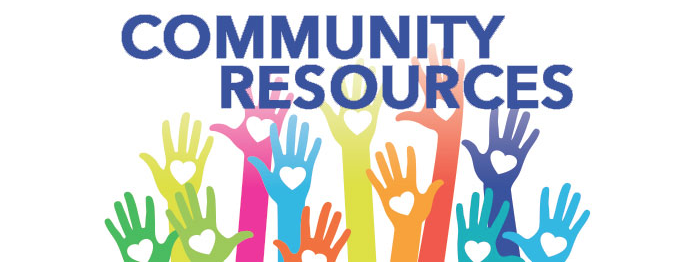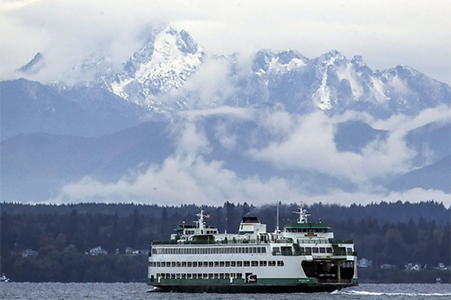RE Sources releases an illustrated guide for climate change solutions in northwest Washington
||| FROM JAY KOSA for RE SOURCES
BELLINGHAM, Wash. — On October 19, Bellingham-based environmental nonprofit RE Sources launched a new initiative blending art, science and on-the-ground stories to help catalyze regional investments in climate resilience, efforts that help communities withstand and bounce back from the climate change impacts that are increasingly being felt across northwest Washington. The Climate-Resilient Northwest Washington initiative comes on the heels of a summer marred by climate change-fueled extreme weather events, such as the June 2021 ‘heat dome’ heat wave, prolonged drought conditions, and substantial wildfires across the West.
Central to the initiative is an interactive Story Map, a digital storytelling platform that combines maps, videos, photos, illustrations and narrative to raise awareness about what climate resilience means and what’s at stake for Northwest Washington. The site highlights existing models for how our communities build resilience quickly when they focus on natural climate solutions such as conservation, restoration and climate-adaptive land management.
The illustrated Northwest Washington landscape, which RE Sources developed with Washington illustrator and conservation advocate Jane Chavey, marks a departure from most climate communications efforts, which tend to be heavy on data and foreboding, by instead focusing on story and inspiration.
“We knew after years of talking with folks about climate change, as well as from personal experience, that you can only read about climate disasters and look at photos of destruction for so long before you just shut down,” said Ander Russell, senior environmental advocate for RE Sources.
“We believe it is a hopeful change of pace to begin by helping folks visualize an alternative to climate catastrophe by actually illustrating it. Climate change is re-shaping our present and our future, but we can still have a lot of say in how that future looks if we act now.”
The multimedia website covers four tracks:
- Picture This, a hand-illustrated depiction of a climate-resilient Northwest Washington landscape, from the Cascade peaks to the central Salish Sea.
- Resilience in Action, a collection of stories about northwest Washington individuals, businesses and organizations that are leading local efforts to build climate resilience through conservation, restoration, science, and adaptive land management.
- On the Ground, a summary of the science around recent regional climate impacts and potential future effects of extreme weather, including drought, increased temperatures, wildfires and smoke, flooding and sea level rise.
- A Solutions Agenda highlighting nine areas of focus that offer multiple benefits to our region’s ecosystems and communities.

RE Sources, which for 40 years has worked to protect the lands, waters and climate of the central Salish Sea region, aims to raise awareness about climate resilience as the region and the world at large are reaching a tipping point in the climate crisis. This summer the IPCC issued “Code Red for Humanity,” noting that a global temperature increase of 1.5C is now assured, and we need a massive effort to curb greenhouse gas emissions to prevent catastrophic levels of warming between 2.7 and 4C. The time for action is now.
“To be better prepared for the impacts of climate change we’re already feeling, we benefit the most by protecting what we already care about: land conservation, habitat restoration, orca and salmon recovery, and pollution prevention,” said Shannon Wright, RE Sources executive director. “Across all of these solutions, we must prioritize resilience efforts that redress the legacy of environmental racism, center communities disproportionately harmed by climate impacts, and uphold Tribal treaty rights.”
While our Washington state and local governments have climate plans in place, most of them focus primarily on climate mitigation—actions to reduce greenhouse gas emissions. Mitigation is critical to making sure we limit the severity of climate impacts, but past inaction means we also need to invest in strategies to adapt to changes that are now unavoidable. For its Solutions Agenda, RE Sources focused on investments in nature-based solutions that can help both with resilience and mitigation. For instance, restoring the region’s shoreline estuaries and wetlands can provide natural buffers from storm surges and flooding while also filtering water, supporting wildlife and fisheries, and sequestering carbon.
The Resilience in Action track highlights the stories of local groups, including the Nooksack Indian Tribe, farming collective Tierra y Libertad, Whatcom Land Trust, Janicki Logging & Construction, and Alluvial Farms, who are responding to climate change’s on-the-ground impacts with conservation and restoration efforts, along with worker protections and climate-friendly land management practices. The stories show that solutions are already being deployed, and our communities just need to make plans and investments that bring these solutions to scale.
Explore the Story Map and visit re-sources.org/climatereslience for more information and actions you can take to help mobilize climate resilience efforts in your community.
About RE Sources
Founded in Bellingham Washington in 1982, RE Sources is a nonprofit organization working to protect our climate, as well as the environment and communities of the central Salish Sea region. We catalyze community action to build a lasting legacy for all of us — clean water, protected shorelines, an end to dangerous fossil fuel projects, and recovery for orcas and salmon. We are a team of trusted and time-tested environmental advocates, educators and scientists. RE Sources gives people practical ways to make a real difference for the planet, from passing stronger laws that protect the environment and empowering youth voices, to holding corporate polluters accountable and reducing waste. We do this through smart policy, grassroots mobilization, hands-on science and environmental education.
**If you are reading theOrcasonian for free, thank your fellow islanders. If you would like to support theOrcasonian CLICK HERE to set your modestly-priced, voluntary subscription. Otherwise, no worries; we’re happy to share with you.**








I love the acknowledgements at the end of this amazing project:
Acknowledgements
We live and work on the ancestral homelands of the Coast Salish Peoples, including Lummi Nation and Nooksack Tribe, who have lived in the region from time immemorial. We acknowledge the Tribes’ treaty rights, as well as our responsibility to uphold them, and we are grateful for the Tribes’ enduring care and protection of the lands and waterways.